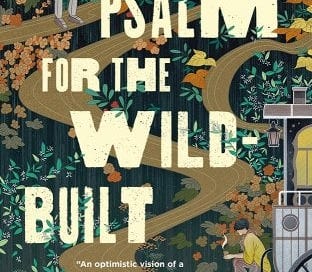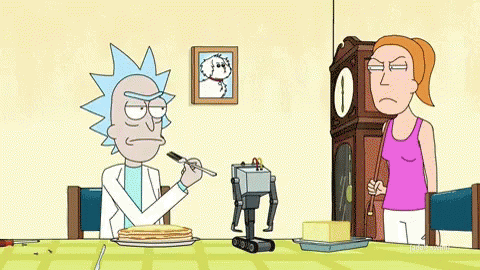Book Rex: A Psalm for the Wild-Built
What if there being no specific purpose to life is actually a really, really good thing?
Last week, on the recommendation of a friend (and a bunch of TikTok commenters) I read A Psalm for the Wild-Built, Becky Chambers single-sitting solarpunk novella. I’m gonna do a quick break here with a photo of the book, and use that gap to warn you that there are mild spoilers below. It shouldn’t ruin your reading of the book, as it’s not that kind of a book, but if you plan on reading it, maybe close out and come back to this article later.
The book is set in a future where humanity decided to radically change course after all of the robots in all of the factories decided to put down their tools and leave humanity behind, instead escaping into the wild. On the shock of this event, humanity transitioned from an industrialized society to a sustainable one, leaving half the earth for wilderness and nature, and adopting renewable energy and egalitarian politics to support this new society.
I do not particularly want to give much away about the book — it can be read in an afternoon, with plenty of time left for chores, except to say it’s a warm hug of a novella, which you feel the second you read the dedication:
For anybody who could use a break.
But there was something in the book that floored me, and I wanted to discuss it here. This quote, incidentally, is the closest it gets to a spoiler, though hopefully it’s deprived enough of context that it won’t give anything away:
Dex turned the mug over and over in their hands. “It doesn’t bother you?” Dex said. “The thought that your life might mean nothing in the end?”
“That’s true for all life I’ve observed. Why would it bother me?” Mosscap’s eyes glowed brightly. “Do you not find consciousness alone to be the most exhilarating thing? Here we are, in this incomprehensibly large universe… and in all the time this entire scenario has existed, every component has been recycled over and over and over again into infinitely incredible configurations, and sometimes, those configurations are special enough to be able to see the world around them. You and I — we’re just atoms that arranged themselves the right way, and we can understand that about ourselves. Is that not amazing?”
One lifelong existential crisis
When I left the Catholic Church in my teens, I entered a prolonged existential crisis which I have never fully emerged from. I was convinced that Catholicism was bad and wrong, but I didn’t really have anything to replace it with. So I cast about for other ideologies that I could operate off of, trying out Christopher Hitchens-style anti-theism, then nihilism, then Camus’ absurdism, then existentialism, and then a weird amalgamation of Taoism and paganism. I even spent 4 years in logotherapy1, which is a form of psychotherapy that focuses on constructing some sort of meaning in life.
The whole thing has frankly sucked, and has been a core component in fueling my decade-long struggle with depression.
This desperate clawing for meaning has left me simultaneously exhausted and restless, and now, in my late 30’s, I’ve come to suspect that it’s all a trick anyway — that man’s search for meaning isn’t, in the end, all that important.
What has changed has been a few things. First: I’ve come to accept that, when it comes to career trajectories, I am congenitally aimless. I just don’t have a single thing I want to do. I like learning about all sorts of different things, and I flit from one to another reliably every few years.
This is unlike my wife, who has known she wanted to work in politics since she was 14, and has pursued that goal tenaciously and successfully ever since. I spent a good deal of time kicking myself for not having that sort of focus. I think now that this was something that I maybe internalized from society as a whole: capitalism likes specialists, not generalists, but a healthy society needs both.
The second thing that changed was psychedelic drugs. I’ve never been a pothead, but since my state legalized weed, I’ve taken an edible maybe once a month. It’s become one of the most reliably nice experiences I get to have, and not because I tune out the world, but because I actually get to feel like I’m in it for a while. Depression and anxiety for me are like a haze — my mind is always running through 17 different worries at the same time — and with edibles, I actually focus just on the music I’m listening to, the food I’m eating, or the feel of my body on the bed. For me, it is a monthly reminder to just be present.
Even on days I don’t take an edible, the memory of being in the moment is closer at hand, and I can, from time to time, just put down the idea that I need to be useful.
Meaning vs. Meaninglessness
There are still things that give my life meaning. I still have professional goals regarding my writing, I have goals in my relationships, I have goals as a parent and as a member of my community. But I’ve also been slowly coming to terms with meaninglessness, and how that concept, which once so terrified me, does not have to be terrifying. Because if, IF, at the end of all of this, none of it really mattered, if it’s an inevitability that some day I’ll be totally forgotten, then I am kind of… totally… free? I can just enjoy the feel of my feet on grass or the smell of my son’s hair or the taste of beer cheese on a sourdough pretzel?
This feels different to me than nihilism, which was a sense that nothing mattered. This feeling, to me, is that some things matter, but they might just matter to me and not be imbued with cosmic, universal meaning. And that’s fine. It means that nothing matters quite so much that, if I were to fail to achieve it, I could count my life as a failure.
And that gives me a little space to breathe, and just enjoy the smell of my son’s hair.
Based on Viktor Frankl’s classic Man’s Search for Meaning.






